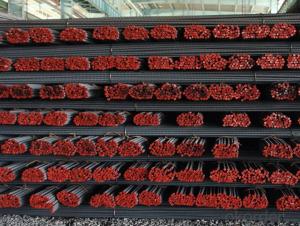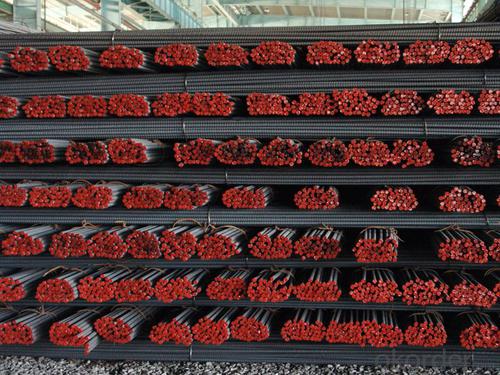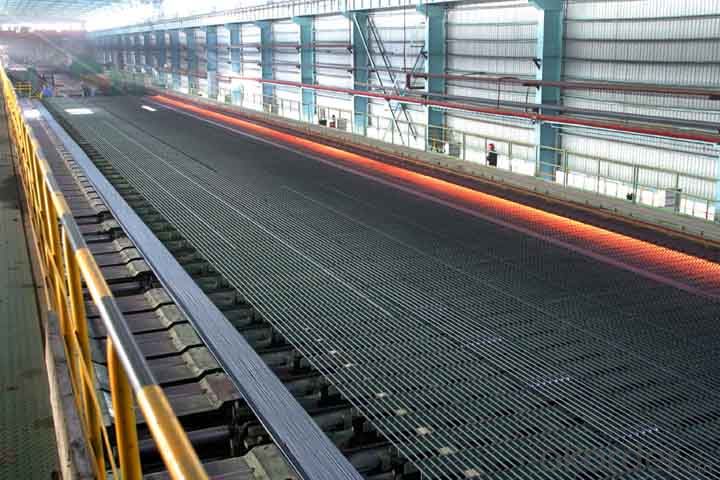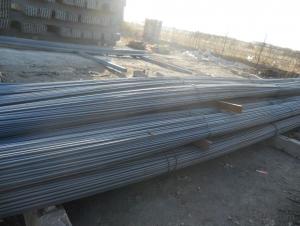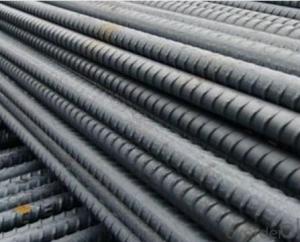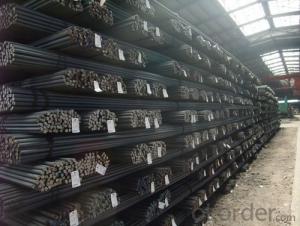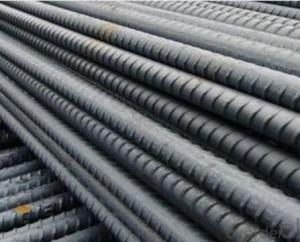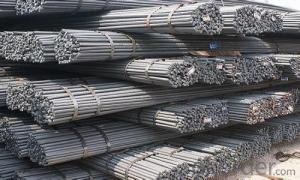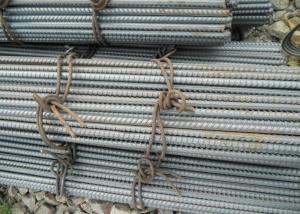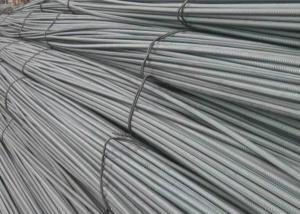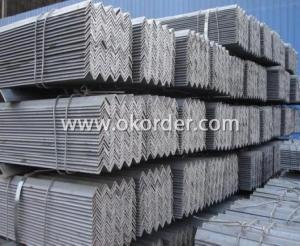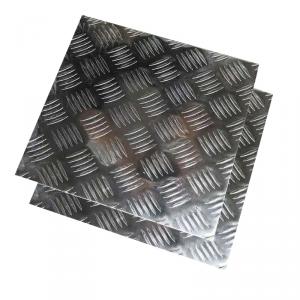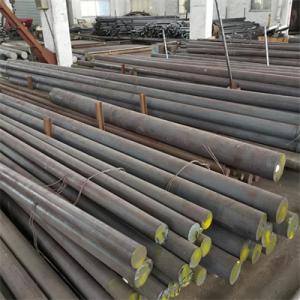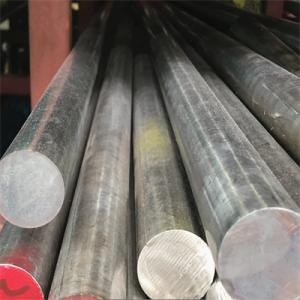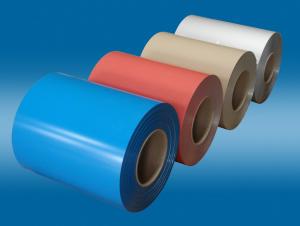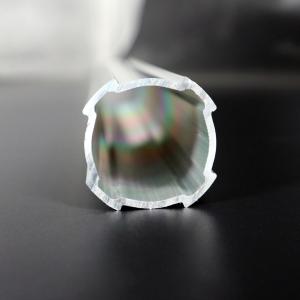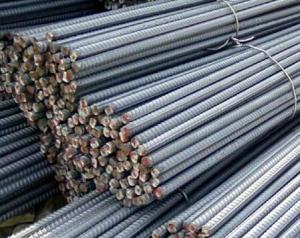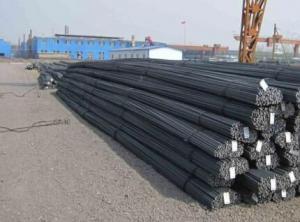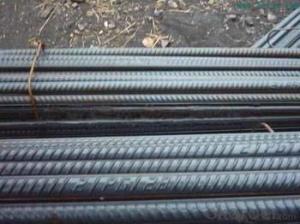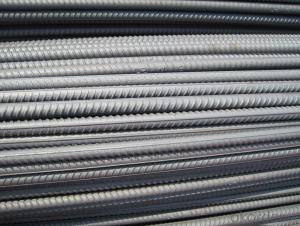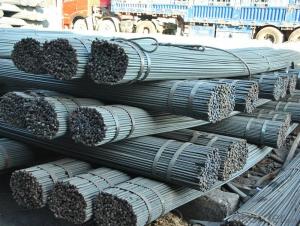Rebar Wholesale Hot Rolled Steel Rebars Deformed Bar EN Standard
- Loading Port:
- China Main Port
- Payment Terms:
- TT or LC
- Min Order Qty:
- 100 m.t.
- Supply Capability:
- 10000 m.t./month
OKorder Service Pledge
OKorder Financial Service
You Might Also Like
Product Description:
OKorder is offering Hot Rolled Steel Rebars Deformed bar EN standard at great prices with worldwide shipping. Our supplier is a world-class manufacturer of steel, with our products utilized the world over. OKorder annually supplies products to African, South American and Asian markets. We provide quotations within 24 hours of receiving an inquiry and guarantee competitive prices.
Product Applications:
Hot Rolled Steel Rebars Deformed bar EN standard are ideal for structural applications and are widely used in forest region, Mines, factories and construction sites laid of the place such as temporary transport line and light motorcycles with line..
Product Advantages:
OKorder's Hot Rolled Steel Rebars Deformed bar EN standard are durable, strong, and wide variety of sizes.
Main Product Features:
· Premium quality
· Prompt delivery & seaworthy packing (30 days after receiving deposit)
· Can be recycled and reused
· Mill test certification
· Professional Service
· Competitive pricing
Product Specifications:
Manufacture: Hot rolled
Grade: HRB335,HRB400,HRB500
Certificates: ISO, SGS, BV, CIQ
Diameter:6mm-10mm
Packing: products are packed in bundles and shipped by break bulk or containers
Deformed Steel Bar | ||
Diameter (MM) | Cross Sectional Area (MM2) | Theorectical Weight (KG/M) |
6 | 28.27 | 0.222 |
8 | 50.27 | 0.395 |
10 | 78.54 | 0.617 |
12 | 113.1 | 0.888 |
14 | 153.9 | 1.21 |
16 | 201.1 | 1.58 |
18 | 254.5 | 2 |
20 | 314.2 | 2.47 |
22 | 380.1 | 2.98 |
25 | 490.9 | 3.85 |
28 | 615.8 | 4.83 |
32 | 804.2 | 6.31 |
FAQ:
Q1: what is the difference between actual weight and theoretical weight?
A1: All the section steel has two weights: actual weight and theoretical weight. Actual weight is the weighing out when the product delivered from the mill. Theoretical weight is calculated by pieces. The invoice can be based on each of them as your request.
Q2: How do we guarantee the quality of our products?
A2: We have established an advanced quality management system which conducts strict quality tests at every step, from raw materials to the final product. At the same time, we provide extensive follow-up service assurances as required.
Q3: How soon can we receive the product after purchase?
A3: Within three days of placing an order, we will arrange production. The normal sizes with the normal grade can be produced within one month. The specific shipping date is dependent upon international and government factors, the delivery to international main port about 45-60days.
Images:
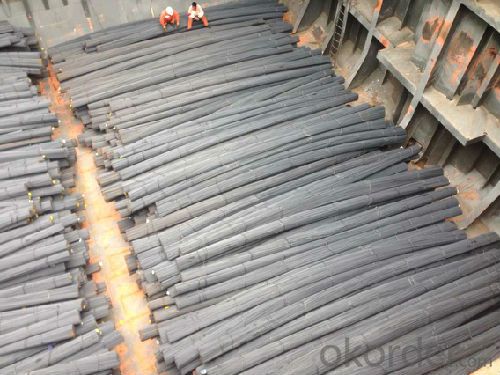
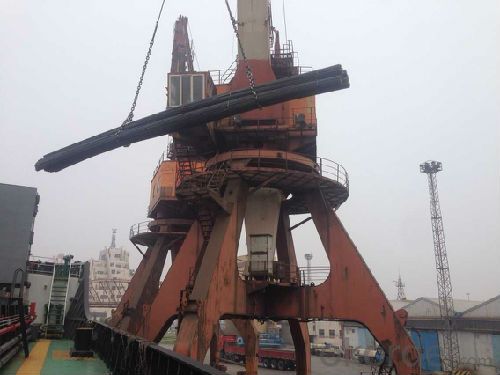
- Q:What are the different types of steel rebars used in road construction?
- There are several types of steel rebars used in road construction, each with its own specific characteristics and advantages. Some of the commonly used types include: 1. Mild Steel Rebars: Also known as carbon steel rebars, these are the most commonly used type in road construction. They have a low carbon content and are relatively inexpensive. Mild steel rebars are suitable for general-purpose applications and provide good strength and ductility. 2. High Strength Deformed (HSD) Rebars: These rebars have higher tensile strength compared to mild steel rebars. They are manufactured by subjecting mild steel bars to mechanical treatments, such as hot rolling, quenching, and tempering. HSD rebars are used in areas where higher load-bearing capacity is required, such as bridge construction. 3. Stainless Steel Rebars: These rebars are corrosion-resistant due to their high chromium content. They are especially beneficial in areas with high humidity, coastal regions, or where road construction is exposed to corrosive substances. Stainless steel rebars are more expensive than other types but offer long-term durability. 4. Epoxy-Coated Rebars: These rebars are coated with epoxy to provide protection against corrosion. Epoxy coating acts as a barrier between the steel surface and the environment, preventing the penetration of moisture and corrosive elements. Epoxy-coated rebars are commonly used in concrete pavements to enhance the longevity of the road. 5. Galvanized Rebars: These rebars are coated with a layer of zinc to protect against corrosion. The zinc coating acts as a sacrificial layer, preventing the steel from coming into contact with corrosive elements. Galvanized rebars are commonly used in road construction projects where corrosion resistance is crucial, such as in areas with high levels of moisture or chemical exposure. It is important to select the appropriate type of steel rebars based on the specific requirements of the road construction project. Factors such as load-bearing capacity, environmental conditions, and budget considerations play a significant role in determining the most suitable type of rebar to be used.
- Q:What is the role of steel rebars in the construction of railway bridges?
- Steel rebars play a crucial role in the construction of railway bridges by providing reinforcement and strength to the concrete structure. They help to distribute the load evenly across the bridge, ensuring its stability and durability, especially when subjected to heavy train traffic and varying weather conditions. Rebars also help to prevent cracks and structural failures, making them an essential component in ensuring the safety and longevity of railway bridges.
- Q:What are the main uses of steel rebars?
- Steel rebars, otherwise known as reinforcing bars, serve as a crucial component in construction and civil engineering endeavors, granting robustness and steadiness to concrete structures. The primary applications of steel rebars encompass the following: 1. Reinforcement of Concrete: Steel rebars are strategically integrated within concrete structures to heighten their tensile strength. While concrete exhibits commendable resistance against compressive forces, it remains vulnerable in terms of tension. By incorporating rebars, the resulting composite material (reinforced concrete) is endowed with the ability to withstand both compressive and tensile forces, rendering it suitable for various applications such as building columns, beams, slabs, and foundations. 2. Enhancement of Structural Stability: Steel rebars play a pivotal role in elevating the structural stability of edifices and infrastructures. They facilitate the uniform distribution of loads across the structure, preventing the occurrence of cracks, sagging, or collapse. Through the reinforcement of concrete elements with rebars, structures become capable of enduring substantial loads, seismic activity, and other external forces. 3. Bridges and Highways: Steel rebars find extensive employment in the construction of bridges and highways. As bridges are routinely subjected to substantial loads and harsh environmental conditions, robust and durable reinforcement is imperative. Steel rebars ensure the longevity and structural integrity of these critical infrastructure projects. 4. Retaining Walls and Tunnels: Retaining walls serve the purpose of holding back soil or other substances, thereby preventing erosion. Steel rebars are commonly employed to reinforce these structures, enabling them to withstand the lateral pressures exerted by the retained material. Similarly, in tunnel construction, rebars bestow strength upon the concrete lining, ensuring stability and averting collapse. 5. Foundations: Steel rebars form an indispensable constituent in the construction of building foundations. They contribute to the even distribution of the structure's weight onto the ground, thereby averting the occurrence of settlement or sinking. Furthermore, rebars anchor the foundation to the ground, endowing it with stability against soil movement or seismic forces. 6. Pre-stressed and Post-tensioned Concrete: In the realm of pre-stressed and post-tensioned concrete construction, steel rebars are employed to introduce compressive forces into the concrete members. This technique elevates the structural performance by diminishing tensile stress, augmenting load-bearing capacity, and minimizing cracking. 7. Masonry Reinforcement: Steel rebars are also utilized to reinforce masonry structures such as walls, columns, and arches. By embedding rebars within mortar joints or cores, the overall strength and stability of the masonry system are enhanced, enabling it to withstand lateral loads and seismic forces. To summarize, steel rebars are indispensable in contemporary construction endeavors, furnishing concrete structures with strength, stability, and durability. By virtue of their capacity to resist tensile forces, they ensure the well-being and longevity of buildings, bridges, highways, tunnels, and other crucial infrastructure projects.
- Q:What are the typical costs associated with using steel rebars in a construction project?
- The costs of utilizing steel rebars in a construction venture can differ based on various elements. These elements incorporate the size and type of the rebar, the amount required, the market conditions, and the project's location. Typically, the expense of steel rebars is calculated per ton or per linear foot. The cost per ton can fluctuate between $400 and $600, while the cost per linear foot can range from $0.75 to $1.50. It is important to note that these prices are approximate and subject to change based on market demand and availability. Furthermore, there might be additional expenses related to the acquisition and handling of steel rebars. These expenses can include transportation fees, storage costs, and the necessary equipment or tools required for installation. Other cost considerations may involve labor costs for cutting, bending, and placing the rebars, as well as any reinforcement detailing required according to the project's design specifications. These costs can vary depending on the project's complexity and the skill level of the laborers involved. It is also crucial to account for any potential wastage or scrap materials that may arise during the construction process. Proper planning and accurate measurements can help minimize these costs. In general, the typical costs connected with utilizing steel rebars in a construction project can be substantial, but they are necessary to ensure structural integrity and reinforcement. It is advisable to obtain quotes from multiple suppliers and contractors to ensure competitive pricing and carefully consider the project's specific requirements before finalizing the budget.
- Q:How do steel rebars affect the overall flexibility of a structure?
- Steel rebars increase the overall flexibility of a structure by providing reinforcement and adding tensile strength to the concrete, making it more resistant to bending and cracking under applied loads.
- Q:How do steel rebars contribute to the overall seismic resistance of a structure?
- Steel rebars contribute to the overall seismic resistance of a structure by providing reinforcement and strength to the concrete elements. The rebars help to distribute and dissipate the energy generated during an earthquake, which helps in reducing the potential damage and ensuring structural integrity. By increasing the ductility and flexural capacity of the structure, steel rebars help to absorb and withstand the seismic forces, making the building more resistant to collapse or significant structural damage.
- Q:What are the common misconceptions about steel rebars?
- One common misconception about steel rebars is that they are prone to rusting and corrosion. However, rebars are typically made with a protective coating or are embedded within concrete, which prevents direct exposure to moisture and reduces the risk of rusting. Another misconception is that thicker rebars always provide better reinforcement. In reality, the appropriate size and spacing of rebars depend on the specific structural requirements and engineering calculations, rather than just thickness.
- Q:Can steel rebars be used in swimming pools and water tanks?
- Yes, steel rebars can be used in swimming pools and water tanks. Steel rebars are commonly used as reinforcement in these structures to provide additional strength and stability. The rebars are typically placed within the concrete or masonry walls of the pool or tank during construction. Steel rebars are highly durable and resistant to corrosion, making them an ideal choice for these applications where they will be constantly exposed to water. Additionally, the use of steel rebars helps to prevent cracking and improve the overall structural integrity of the pool or tank.
- Q:Can steel rebars be used in the construction of data centers and IT facilities?
- Yes, steel rebars can be used in the construction of data centers and IT facilities. Steel rebars are commonly used in construction projects to enhance the strength and durability of concrete structures. In the case of data centers and IT facilities, where robust construction is crucial, steel rebars can provide the necessary reinforcement to ensure the integrity and safety of the buildings.
- Q:Are steel rebars suitable for use in industrial structures?
- Yes, steel rebars are suitable for use in industrial structures. Steel rebars, also known as reinforcing bars, are commonly used in the construction industry to provide added strength and stability to concrete structures. They are made from high-strength steel and have excellent tensile strength, making them ideal for reinforcing concrete in industrial structures that are subject to heavy loads, vibrations, or other dynamic forces. Steel rebars also have good ductility and can withstand bending without breaking, which is important in industrial structures where high structural integrity is required. Additionally, steel rebars have good resistance to corrosion, which is essential in industrial environments where exposure to moisture, chemicals, or other corrosive agents is common. Overall, steel rebars are a reliable and durable choice for reinforcing industrial structures, ensuring their long-term structural stability and safety.
1. Manufacturer Overview |
|
|---|---|
| Location | |
| Year Established | |
| Annual Output Value | |
| Main Markets | |
| Company Certifications | |
2. Manufacturer Certificates |
|
|---|---|
| a) Certification Name | |
| Range | |
| Reference | |
| Validity Period | |
3. Manufacturer Capability |
|
|---|---|
| a)Trade Capacity | |
| Nearest Port | |
| Export Percentage | |
| No.of Employees in Trade Department | |
| Language Spoken: | |
| b)Factory Information | |
| Factory Size: | |
| No. of Production Lines | |
| Contract Manufacturing | |
| Product Price Range | |
Send your message to us
Rebar Wholesale Hot Rolled Steel Rebars Deformed Bar EN Standard
- Loading Port:
- China Main Port
- Payment Terms:
- TT or LC
- Min Order Qty:
- 100 m.t.
- Supply Capability:
- 10000 m.t./month
OKorder Service Pledge
OKorder Financial Service
Similar products
New products
Hot products
Hot Searches
Related keywords
